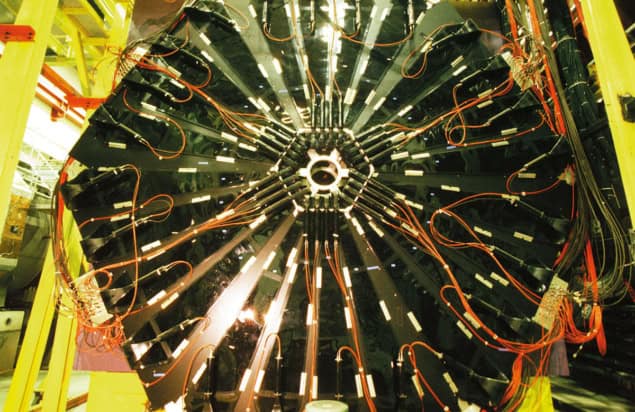Scientific competition is more than just a battle for glory and prizes, says Robert P Crease

Scientists make peculiar competitors.
Consider the studies on quarks at CERN in Switzerland and at the Brookhaven National Laboratory in the US. In February scientists at CERN announced they had “compelling evidence” for a soup of free quarks and gluons at the Super Proton Synchrotron (SPS) (Physics World March 2000 p5). In June physicists at Brookhaven’s Relativistic Heavy Ion Collider (RHIC) began looking at quarks at ten times the energy of the SPS. Meanwhile, CERN scientists are building the Large Hadron Collider (LHC), which in six years’ time will study quarks at 30 times the energy of RHIC.
Media accounts often portray this situation as if the labs are locked in nothing more than a heated battle for a trophy. (The quest for the Higgs boson, pitting CERN against Fermilab, is another example.) The coverage tends to emphasize the posturing, claim-staking and antagonism, implying that one lab’s gain is the other’s loss.
If so, the two labs are also engaged in a lot of perverse behaviour. After all, the Brookhaven lab is building magnets for the LHC, and is a hub for dozens of American institutions contributing to the ATLAS detector at the LHC. Both CERN and Brookhaven also have staff members who are – officially and unofficially – helping the other lab’s projects.
Two kinds of competition
Politicians and journalists are bound to find such behaviour mysterious and self-defeating. When they compete with others in the same field, the aim is to secure a prize: an electoral victory or a news scoop. To gain it means beating your opponents: your strength is proportional to their weakness. This is political competition.
But athletes, artists and others who work in a creative community of performers know another kind of competition. In performance competition, the aim is to achieve a superior level of performance. Individuals enhance their own performance by sharing and cooperating with others as much as possible.
To call this “friendly competition” – in other words, to imply that it is simply political rivalry minus the antagonism – would be wrong. The primary goal is different: it is to see the overall performance level rise. If your competitor is strong, so are you. It is not that the competitors do not care about winning. They are striving to win. But in performance competition, winning is not everything, or even the most important thing.
Drew Hyland, a philosopher from Trinity College in Connecticut, has argued persuasively that winning is indeed not the most important thing in true competition. Hyland finds two features of competition especially significant. One is that competition is collaborative: “com-petitio” literally means to seek or strive together. The second is that competition elicits a superior level of play from its participants. As Hyland points out, competitors are thrust by their mutual struggle into situations of greater than normal “immediacy, intensity and immersion”, in which they can do things that they could not otherwise – or at least not as well.
What he calls “alienated” competition – when competition degenerates into mere opposition – amounts to a breakdown of true competition. What is essential for true competition is a collaborative and mutually supportive community, in which performers take risks and respect each other’s risk-taking – however much they may also be merciless critics of each other’s performance.
Hyland points to familiar features of competition that support his argument: the concern for improvement and excellence in performance (for “doing it right”); the desire to seek difficult (not merely obtainable) goals and to find challenging (not merely beatable) opponents; and the fact that competition is fun. Of course, performance competition in science can degenerate into political competition, where the quest for priority, publicity or prizes becomes paramount.
And the competitive situation is more complicated in science where industrial or governmental sponsors are involved. When the stakes are high, sponsors may try to shape the game as a political competition. In 1952, for example, Brookhaven scientists came across a magnet technique known as “strong focusing” that vastly improved accelerator beams, and excitedly communicated the information to colleagues/rivals at CERN and the Lawrence Berkeley Laboratory.
They were astounded when the US Atomic Energy Commission asked them to keep the details a secret. (It was too late.) The commission, it transpired, was also sponsoring a top-secret accelerator-based technique to make weapons-grade nuclear material, for which the agency thought strong focusing might be applicable.
The critical point
When discoveries in science are difficult and counterintuitive, and the stakes are high, it may make military or economic sense from a sponsor’s point of view to require the participants to behave as though they were involved in political competition. The discovery of atomic fission on the threshold of the Second World War is a classic military example. The fierce political battles that erupted after the war among high-energy physics labs for accelerators and detectors is another instance.
Recently, the agencies sponsoring American participation in the LHC have proscribed Americans from formal collaboration on ALICE, the LHC experiment dedicated to heavy-ion physics. (Ironically, ALICE’S magnet, inherited from a previous experiment, was largely paid for by the US Department of Energy.) The principle seems to be that the limited US funds for heavy-ion research ought to go to Americans. Still, Brookhaven and CERN heavy-ion researchers are finding informal ways to collaborate via e-mail, visits, phone calls and other means. “We do everything together,” one told me.
Politicians and journalists will not be able to understand such behaviour. They think that because prizes and prestige are involved, the aim of the game is to do everything one can, within the rules, to win. They think all competition is political competition.
But artists, athletes, scientists and others who work in a community of mutually supportive creative performers will smile. They know that, in reality, being part of such a community is the truest way to compete.



